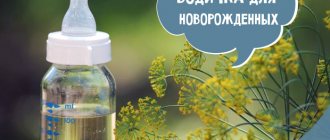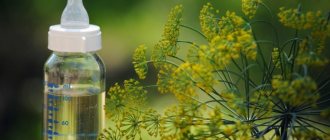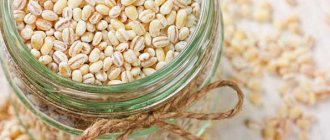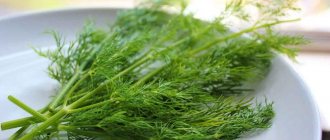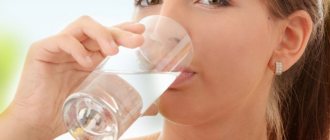October 28, 2016
Averyanova Sveta
90% of newborns and their parents inevitably experience infant colic. This extremely unpleasant period lasts from several weeks to a couple of months, until the child’s body adapts to the external environment and a new type of nutrition.
A folk remedy – dill water – helps to alleviate the baby’s condition. Herbal medicine has been used in practice for many decades. To find out how to give dill water to a newborn, at how many weeks you can start therapy and how often you are allowed to take it, read our article.
Why does colic occur?
Infantile colic is the name of a pain syndrome characteristic of children from 1–2 weeks from birth to 3–4 months.
The cramping attack lasts a couple of minutes or several hours. The cause of pain is intestinal spasms and gas pressure on its walls. At the same time, the child experiences discomfort in the abdomen, a feeling of fullness in the stomach, and a desire to regurgitate food.
Naturally, the baby cries, is capricious, and the hysterics can last all day. Fortunately, after a couple of months, the children’s intestines will learn to cope with gases, the stomach will be able to digest food fully, that is, the gastrointestinal tract organs will work correctly. By 4 months, in 90–95% of infants, the issue of colic is resolved.
So, the main cause of colic in babies is the natural process of starting the gastrointestinal tract after the birth of a child. It is impossible to change or “cure” this condition; you can only make the child’s life easier with the help of safe medications. But there are several other factors that provoke pain and discomfort in the baby’s intestines; they can be resolved at home or together with a doctor:
- Incorrect attachment to the breast.
During feeding, the baby not only eats mother's milk, but also swallows air. This interferes with normal digestion and increases gas formation. It is easy to correct the situation - make sure that the baby grasps the nipple deeply and completely; After feeding, keep it in a column for 5-10 minutes - excess air will escape. - Failure of a nursing mother to comply with the diet. During breastfeeding, a woman should not eat foods that increase gas production, such as sweet, smoked, salty foods, drink alcoholic beverages, soda, or add hot seasonings or garlic to food. Controlling your diet will change the life of mother and baby.
- Gastrointestinal pathologies. If colic continues to bother the baby after the 5th–6th month of life, parents need to see a doctor, undergo an ultrasound of the abdominal cavity, have stool tested for scatology and other tests. Perhaps the intestinal problem has more serious causes.
Along with following a diet, correct posture during feedings, and tummy massages, you need to help your child cope with colic with the help of natural medicines. For example, dill water for newborns has long earned respect from mothers, grandmothers and doctors. It costs much less than drugs with symbiotics, and the effectiveness of use is no worse.
On a note! Breastfed and bottle-fed babies suffer from colic. The use of dill water is indicated for any type and pattern of nutrition of the baby.
Does dill help newborns with colic?
In folk medicine, dill is used as a medicinal raw material, which can be used to improve intestinal function and reduce the accumulation of gases in infants.
To prepare dill water, use ripe fennel fruits or herbs. All parts of the plant contain flavonoids, essential oil, pectin, carbohydrates, a set of mineral salts, vitamin A, ascorbic and nicotinic acids. Together they improve the functioning of the digestive organs, eliminate and alleviate painful cramps in the stomach, regulate gas exchange, and relieve irritability. Fennel fruits are offered to children both during an attack of intestinal colic and to prevent their occurrence.
Positive reviews from a large number of parents confirm the effectiveness of fennel in the treatment of intestinal colic in children in the first months of life. However, to achieve a positive result, an integrated approach is important: the diet of a nursing mother, abdominal massage to relieve gases and improve intestinal motility, the correct choice of infant formula and adherence to feeding techniques.
Negative reviews are rare and are mainly due to the fact that the medicine turned out to be ineffective and difficult to give to a newborn.
Operating principle and benefits
Thanks to a diverse set of biologically active components, consumption of dill normalizes metabolism, improves motility of the digestive tract, and enhances the secretion of the digestive glands.
All parts of the plant have expectorant, antispasmodic, choleretic, antibacterial and sedative effects. In addition, fennel is used to normalize appetite and digestion, and is recommended for lactating women to improve lactation.
Side effects if you follow the dill water preparation technique and application regimen are extremely rare. In isolated cases, skin rashes, itching, and urticaria are possible.
Composition and beneficial properties
Dill water in pharmacies is prepared from fennel oil and distilled water. Fennel is the younger brother of dill, belongs to the Umbelliferae family, but is bushier.
It has antispasmodic properties and is well tolerated by children. Sold in bottles of 50–150 ml. The concentrate should be stored in the refrigerator and used within 30 days.
At home, the medicine is made from ordinary dill seeds, brewing them with boiling water. The effect of a medication prepared by yourself is no different from the benefits of a pharmaceutical solution. But for the first treatment experience, it is better to buy a ready-made version, since it is sterile and contains water without unnecessary impurities.
A pharmacist at a pharmacy can offer another type of herbal medicine - dill herbal tea. Sold in tea bags. Prepared from chopped dried dill. This option is suitable for children from 2-3 months and mothers.
Dill seeds and tinctures based on them have many beneficial properties. This herbal medicine can be taken not only by children, but also by mothers who are breastfeeding to increase lactation, improve appearance and well-being after pregnancy and childbirth.
Dill tea and water have the following effect on the baby’s body:
- Reduces intestinal pain and bloating.
- Relaxes the muscles of the gastrointestinal tract, relieves spasms.
- Relieves intestines from stagnation.
- Relieves spastic constipation.
- Stimulates the production of digestive enzymes.
- Improves blood circulation.
- Treat inflammatory processes.
- Bile is expelled.
- Increases the immunity of the newborn.
- Improves appetite.
- Dill contains vitamin B1 (thiamine), it has a positive effect on the nervous system and improves sleep quality.
On a note! Dill water can be given to older children and adults to treat colds, coughs, heal wounds, and prevent problems with the heart and blood vessels.
Chemical composition
Dill seeds have a rich biochemical composition. They contain the following microelements:
- manganese;
- calcium;
- iron;
- selenium;
- zinc;
- copper;
- magnesium;
- potassium;
- phosphorus;
- sodium.
In addition, the seeds contain vitamins :
- group A;
- Group C;
- group B.
They are also 18% fatty oils, which contain such acids:
- oleic;
- palmint;
- linoleic;
- petroselinic
Fennel seeds are rich:
- flavonoids;
- thiamine;
- carotene;
- riboflavin.
All the substances presented are very beneficial for the baby’s body.
Instructions for use
Treatment of flatulence and colic in infants using dill water should begin with an allergy test. Do this with any folk herbal medicine if the child has diathesis, a hereditary predisposition to intolerance.
Do the test early in the morning, before the first feeding. Give the baby 2-3 ml of dill infusion, watch the reaction throughout the day. If there is no rash, itching, or redness on the body and face, you can begin preventing colic as usual.
How to give it to a newborn
The dosage of dill water depends on the age of the child. Measure the solution with a syringe or measuring spoon - an overdose can lead to poisoning. Increase the amount of medicine gradually. (Important! The table can be scrolled left and right)
| Type of infusion | Age | Dose, method of administration | Frequency of reception |
| Dill water | 3-6 weeks | 0.5 tsp. (2.5 ml), gradually increase to 5 ml | 20 minutes before feeding 1-2, then 3 times a day |
| From 1.5 months | 1 tsp. (5 ml) | Before feeding, 3–8 times a day | |
| Dill concentrate | 3-6 weeks | 10–15 drops are diluted in 1 tsp. water or breast milk (formula) | 1-3 times a day |
| From 1.5 months | 20–25 drops diluted in water | 3–6 times a day | |
| Herbal tea | 3-6 weeks | Half a teaspoon of brewed and cooled tea can be mixed with milk | 2–3 times a day |
| From 1.5 months | 1–2 tsp. can be given pure and diluted with water, formula, breast milk | 3–8 times a day before feeding |
If the newborn categorically refuses the medicine and spits out the infusion, use some tricks. Fill the dill water into a Nurofen syringe. Pour slowly into your open mouth. If the baby sucks on the tip, don’t resist, let him drink like that.
Important! The benefits of using a healing medicine can only be noticed with regular use.
When and how to drink for a nursing mother
Breastfeeding obliges the mother to follow a diet and monitor lactation so that the baby does not suffer from gas and does not go hungry. Dill water is beneficial in two directions: it reduces flatulence in the baby after feeding and increases the amount of milk in the mother.
Women can drink a herbal infusion of fennel and dill seeds if the child is not allergic to herbal medicines.
It is more convenient for adults to use tea for therapy. Brew a glass of fresh medicinal drink before feeding 2-3 times a day; to increase lactation, you need to drink the infusion for at least 1-2 weeks. Drink the tea in small sips when warm.
Important! You cannot add honey, sugar, or lemon to brewed tea. This can cause allergies in the child.
At what age is it allowed?
Dill water for newborns for colic is allowed from 1–2 weeks. The first days after the maternity hospital, babies are not bothered by their tummy; mother’s bacteria live in their intestines. Problems begin a little later, from the 10th to 21st days after birth.
How to store
Homemade medicine for babies can be stored in the refrigerator for no more than 3 days. But it is much safer to prepare a fresh infusion daily. Keep the medicine bottle in the cold for no more than 30 days. The closed package of fennel concentrate and tea is stored in a dark, cool place for a long time - up to 2 years; the medicine cannot be frozen.
Operating principle
Fennel and dill seeds act on children's intestines as carminatives. Vegetable oils destroy gas bubbles in the intestines and promote their removal from the gastrointestinal tract.
Simultaneously with the elimination of bloating, they have a positive effect on peristalsis: feces move faster, the pressure on the intestinal walls is reduced. Mothers notice the effect of taking this folk remedy after 20–30 minutes, gases begin to actively pass away, and the baby calms down.
The herbal medicine will act on the well-being and condition of a nursing mother as follows:
- Digestion improves.
- Blood circulation is normalized.
- The chair is stabilized.
- The quality of milk improves.
- Congestion in the mammary glands is eliminated.
This is interesting! According to ancient beliefs, women’s milk supply increases even from the smell of dill, so a tassel of the herb was hung over the bed, and a bag of seeds was placed under the pillow.
The use of dill water for the treatment of newborns
There are often cases when dill water for newborns is the only remedy approved for use in the treatment of abdominal colic. This is a natural medicine made from the seeds or greens of fennel, also known as fennel. You can buy it or make it yourself - the recipe for the drug is simple and consists of ingredients available to everyone.
Composition and release form
The pharmaceutical version of the drug is a weak yellowish liquid with a faint anise smell and a strong spicy taste. It is available in the form of a children's herbal tea, a concentrate for preparing a solution, or a ready-to-use product. They all have the same medicinal properties, but differ slightly in the method of preparation and dosage when used.
The main component of the product for infants is not the usual salad dill, but its close relative - fennel. The seeds of this plant are used to brew water. The concentration of the substance in the finished solution should not exceed 0.05-0.1%. Different manufacturers may add additional components to it to enhance the healing properties. Most often these are essential oils or extracts of fennel itself, anise, chamomile and other medicinal plants. They enhance the effect of the substance and have an additional antispasmodic effect to quickly relieve discomfort in the baby.
Operating principle
Fennel water has a strong carminative effect thanks to the essential oils of this plant. Regular dill has similar properties, but they are much less pronounced. Once in the intestines, the oils prevent the accumulation of gas bubbles in it and accelerate their removal through the rectum, and also reduce gas formation and have a slight antiseptic effect.
Fennel oil also has a beneficial effect on intestinal motility, normalizing the functioning of its muscles. This facilitates easier and faster movement and subsequent removal of feces and gases from the gastrointestinal tract, which prevents their excessive accumulation. Thus, dill water reduces the pressure on the walls of the intestines and prevents them from expanding, which causes the disappearance of pain and discomfort in the baby.
As a result, the functioning of the entire gastrointestinal tract improves, food begins to be better absorbed, the quality of metabolism and the amount of nutrients received by the child’s body increases. This has a beneficial effect on the entire body: the functioning of the heart is stabilized, the condition of the respiratory system and kidneys is improved, regenerative abilities are enhanced, due to which scratches and wounds begin to heal faster. Thus, consuming dill infusion is very beneficial in the long run.
Indications and effects on the body
The main indication for the use of fennel mixture is intestinal colic in infants. This condition occurs in almost every baby in the early stages of life due to the adaptation of the digestive system to breast milk or formula. It is caused by excessive accumulation of gases that put prolonged pressure on the intestinal walls and expand them, causing pain.
Symptoms of colic are pronounced discomfort in the baby that occurs during or immediately after feeding and ends after natural bowel movements or release of gas. Most often, a decoction of dill is the only remedy that can be used by one-month-old or younger children to combat this condition. It has the following effects on the body:
- helps remove gases and feces from the body;
- relaxes smooth muscles, having an antispasmodic effect on it;
- provides a bactericidal effect without affecting the state of the natural microflora of the gastrointestinal tract;
- relieves pain by reducing the load on the intestinal walls;
- helps relieve inflammation;
- stimulates kidney function and has a diuretic effect;
- helps improve appetite in newborns;
- improves the production of digestive enzymes, which helps the body absorb food and prevents future intestinal disorders;
- strengthens the immune system due to the high content of vitamins and other nutrients;
- calms the child and has a beneficial effect on his sleep.
According to the instructions for using dill water for newborns, this drug is symptomatic, that is, it is unable to completely cure intestinal colic. However, it eliminates a significant part of the child’s discomfort and pain, allowing him to eat frequently and nutritiously. This condition most often does not require more thorough treatment and goes away on its own as the baby grows and his digestive system develops. This usually happens around 6 months of age.
Back to contents
Side effects
In 99% of cases, dill water, purchased at a pharmacy or prepared at home, does not have a negative effect on the child’s health. The medicine may be dangerous if:
- The baby has an allergic reaction to the active ingredient: dill or fennel oil. The allergy will manifest itself in the form of a rash, urticaria, and in severe situations – shortness of breath, asphyxia, and pulmonary edema.
- The mother prepared the medicine at home, without observing the proportions, and gave the baby too large a dose. In this case, the child will be poisoned by water, there will be vomiting, diarrhea, frequent regurgitation, and the temperature will rise. The child will need medical help and gastric lavage.
Avoiding side effects is simple: test the tolerance of fennel and dill before starting intensive treatment of colic, prepare the medicine from pure seeds, and follow the dosage.
Important! Dill water has a diuretic effect. This does not harm the baby if the baby receives additional water.
Baby's gastrointestinal tract
Understanding the processes occurring in the child’s internal organs will allow you to quickly navigate the issues of helping the baby.
The formation of the gastrointestinal tract of a newborn is a complex process. Only by the end of the first year of life does his work stabilize. Before this period, not all enzymes are produced; the pancreas is still weak and produces little bile, the amount of which is not sufficient for the normal functioning of the body.
The intestinal microflora is not stable. The child suffers from flatulence, frequent regurgitation occurs, and bowel movements occur irregularly. As the internal organs develop, everything falls into place. But until this happens, the baby may have disturbed sleep and appetite. Even newborns in excellent health suffer from frequent bloating in the first few months of life.
Of course, it is impossible to speed up the process of formation of the gastrointestinal tract, but parents are quite capable of helping the child.
How to cook at home
It’s not difficult to make a herbal dietary supplement from dill seeds at home yourself. In folk medicine there are several recipes on how to prepare healing water for infants step by step.
Method 1
Take dry dill seeds (1 tsp), pour into a coffee grinder, and grind.
Pour boiling water (200 ml), place in a water bath and simmer for 20 minutes. Remove from heat. Leave for another 45 minutes, strain through cheesecloth. The water is ready.
Method 2
If there are no seeds, make dill tea from the greens. Finely chop 100 g of herb, pour boiling water over it and leave to cool for 40–45 minutes. Strain and pour into a bottle. You should drink the tea on the same day and throw away the rest.
Method 3
You will need to buy fennel oil at the pharmacy. Dilute 0.05 g in 1 liter of boiled or distilled water. Refrigerated storage – 1 month.
You should use a home remedy in the same way as a pharmacy remedy.
Dill water for newborns
After birth, active processes of adaptation to life outside the mother’s womb begin in the baby’s body, and the baby’s gastrointestinal tract reacts most quickly to changes in work. The well-known colic of newborns is an ailment that attacks the fragile body of a baby. They tested the strength of babies and their mothers of the past, and do not please newborns and their parents today. But there is one time-tested remedy for newborns - dill water.
What is dill water
Dill water is not simple dill seeds soaked in water, and certainly not green sprigs brewed with boiling water. The recipe for dill water is much more complicated. This miracle cure for newborn colic is actually a 0.1% solution of fennel oil. It is this plant that is popularly called “pharmacy dill.”
How does dill water help with colic?
Preparations developed on the basis of fennel have pronounced medicinal and preventive properties:
- calm down;
- relieve cramps;
- have an antimicrobial effect;
- relieve inflammation;
- increase lactation.
That is why fennel is used for colic in newborns. What happens in the baby’s intestines: the sterile environment of the internal organs is gradually populated by bacteria. As a result, the correct microflora, represented by bifidobacteria and lactobacilli, should form in the child’s gastrointestinal tract. This is an ideal development of events; in reality, the first “tenants” in the intestines are opportunistic microorganisms. They cause the breakdown of mother's milk or infant formula with an increased content of gases. As a result, intestinal bloating occurs, accompanied by spasms - colic.
The use of dill water in this condition does not help populate the intestines with the right bacteria, but it helps relieve pain, reduce inflammation and reduce the effect of pathogenic flora.
How to prepare dill water at home?
Dill water, unfortunately, is not sold in finished form. It is made to order in the prescription departments of pharmacies. But how did our grandmothers do it in the past? Quite simple: you need to take fennel seeds (pharmaceutical dill, not ordinary) and follow the instructions:
- Pour 2-3 g of fennel seeds into a dry bowl.
- Pour boiling water over them.
- Place in a water bath for 20 minutes.
- Leave for 45 minutes in a warm place.
- Strain through cheesecloth.
It’s even better to use fennel oil: take 0.05 g of oil per liter of water and stir everything well. This solution can be stored in the refrigerator for about a month. Manufacturers of baby food tried to help young mothers and their children. An affordable remedy that saves babies from colic is fennel-based tea. It's still the same dill water, only with a more pronounced taste.
How to give dill water to a newborn
The main rule is to give the “medicine” before meals! It is better to drink water from a spoon for babies who are fed mother's milk, and for babies who are bottle-fed, you can pour it into a bottle. If the child refuses to accept the new taste, it is recommended to mix dill water with breast milk or formula.
At the first dose, give one teaspoon and observe the baby’s reaction. Usually a positive result appears within 10-15 minutes after administration. At first, the daily dose will be 3 teaspoons, but gradually the amount will increase. Usually, 5-6 doses of fennel infusion are enough for children to normalize their condition.
Dill water for newborns is a proven remedy for colic. The rumor about its wonderful properties passed from mouth to mouth, and the recipe for its preparation was passed down from generation to generation. What to give your baby - homemade dill water or fennel tea - is up to you, the main thing is that the healing properties of a simple plant will help the baby survive the process of adaptation to life outside the womb.
Analogs
For severe colic, doctors prescribe medications similar to dill water for young babies and mothers. These are herbal and synthetic based medicines. There is no difference in principle of operation. We will give a description of the composition and therapeutic effect of the most popular of them.
"Plantex"
The only complete analogue of dill water. Contains fennel seeds. Production is established in the form of granules for dissolution in water. The risk of negative reactions and side effects is minimal, and the discomfort will subside quickly – within 20–30 minutes.
"Espumizan"
Drops are used for newborns. It is not a painkiller, it is prescribed to reduce gas formation and remove toxins in case of poisoning. You can take drops before meals and during meals. Children from 1 month are given 5-10 drops 5 times a day. The medication should take effect within 15–20 minutes. According to parents, Espumisan can slightly weaken the stool in children up to 3-4 months old.
"Baby Calm"
This is a carminative, antispasmodic, analgesic dietary supplement. The composition of the drug, which has the international name Baby Calm, includes oils: dill, mint, and anise. The solution is diluted with water before drinking. “Baby Calm7 is approved for newborns from 2 weeks of age.
"Bobotik"
Available in the form of drops of transparent or cream color. The active ingredient is simethicone. The drug reduces flatulence. According to doctors and parents, bobotik is well tolerated by young patients and the effect is achieved quickly.
"Sub Simplex"
The active ingredient is simethicone. Available in the form of drops and suspension. You need to take the medication before or after meals to prevent flatulence before going to bed at night. Newborn children are prescribed 1/2 tsp. 3 times a day, by the age of three months - 1 tsp.
Safe medications for newborns can be given to children for a long time until the colic problem goes away. Often babies experience gastrointestinal discomfort when they first try to introduce complementary foods at 5–7 months of age. If you get gas from adult food or have a stomach ache, you can return to taking dill water or its equivalent.
On a note! Dr. Komarovsky is skeptical about any herbal infusions for the treatment of colic in newborns. He suggests replacing fennel with any other plant, supposedly the effect will remain the same. This opinion causes a lot of controversy and controversy. Whether you agree or disagree with the teledoctor is up to you.
Buy or cook?
Dill water should be in every family with small children. It has anticonvulsant, anti-inflammatory and sedative effects. You can either buy it at a pharmacy or prepare it yourself according to a prescription - in principle, there is no difference. In any case, it will relieve pain in the baby’s tummy.
It is worth noting that dill water is not prepared from dill, as its name might lead you to believe. In fact, it is made from fennel, or rather, from its seeds. Therefore, if there is no dill in the composition, do not be surprised. This plant is much better in its medicinal effect than dill.
There are many recipes for making dill water, so if you can’t find it in a pharmacy, which is very rare today, you can make it yourself.
To prepare a decoction, you need to take seeds of which you are sure of the quality - best from your own garden.
Contraindications
A natural preparation made from fennel and dill seeds may be harmful if children have the following pathological conditions:
- allergies to herbs, dill, fennel oils;
- postpartum jaundice;
- inflammation of the gastrointestinal tract;
- appendicitis;
- acute colitis.
In the opinion of parents, any medications for newborns, even the safest and most harmless ones, should be prescribed by a pediatrician. If you notice signs of intolerance or symptoms of deterioration in health, immediately stop treatment and consult a doctor.
Indications for use
For infants, the medicine is used to improve intestinal function and reduce the accumulation of gases.
For adult patients, experts can recommend Dill water for diseases of the digestive tract with intestinal spasms, pain in the gastrointestinal tract, increased flatulence and dyspepsia . In addition, it is prescribed to normalize appetite and digestion.
The drug acts as a vasodilator , so it is often taken in the first stages of coronary insufficiency , angina pectoris , hypertension , and arterial hypertension . This remedy is also recommended for infectious and colds of the upper respiratory tract and bronchitis without sputum .
The drug is recommended to women during breastfeeding to increase lactation, as well as for menstrual irregularities .
Answers to frequently asked questions
Is an allergy possible?
Dill and fennel are not highly allergenic plants. But they can cause allergies in children who are genetically predisposed to a negative reaction to herbs and food.
Can it be added to the mixture?
If the baby does not agree to drink the medicine in its pure form, feel free to add the solution to the formula or breast milk. This will improve the taste of the drink, and the infusion will be better absorbed.
Is it possible to overdose?
There is no need to abuse this folk remedy to treat colic. Follow the recommendations from the annotation to the pharmacy when calculating the dose by age. The maximum amount of medication per day for an infant up to two months of age should not exceed 20 ml.
Could there be constipation or diarrhea?
Dill water contains a lot of fiber. Such an infusion cannot strengthen the stool, but it can cause diarrhea with regular and long-term use. But liquid feces are more often caused by food from a nursing mother or an inappropriate mixture.
Can there be green stool?
While taking fennel tincture, infants may have greenish or yellow stools. It is normal if the child poops without foam; bowel movements occur no more than 2-3 times a day.
Terms and conditions of storage
Pharmacy dill water should be stored in the refrigerator for no more than 30 days. Self-collected and dried dill seed should be stored for up to 24 months in a sterile container with a lid in a dry and well-ventilated area.
Dill fruits purchased at a pharmacy must be stored at a temperature no higher than 25⁰C and a relative humidity of no more than 70%. Shelf life: two years.
Reviews
Reviews about this drug are mainly left by mothers who gave the drug or infusion prepared at home to their infants. Opinions about him are mostly positive. It is reported that the effect after using the product becomes noticeable after 15-20 minutes.
Negative reviews of Dill Water for Newborns say that the medicine was ineffective or was difficult to give to the baby. Reports of allergic reactions are extremely rare.
Price of Dill water, where to buy
The average price of Dill water is 150 rubles per 100 ml bottle. However, it is not sold very often in the pharmacy chain. You can buy Dill water in those pharmacies that have a prescription department.
In Ukraine, products similar in composition and effect are sold, for example, Happy Baby for newborns or Dill Oil , they cost on average 60-120 hryvnia.
- Online pharmacies in RussiaRussia
- Online pharmacies in UkraineUkraine
- Online pharmacies in KazakhstanKazakhstan
ZdravCity
- Dill water 50ml KorolevPharm LLC
200 RUR order
Pharmacy Dialogue
- Dill water 15ml concentrate for preparing a solution 50ml Korolevfarm LLC/Akrikhin
RUB 205 order
show more
Pharmacy24
- Dill water Happy Baby 15 ml Hisunit Ltd, Israel
132 UAH. order
show more
